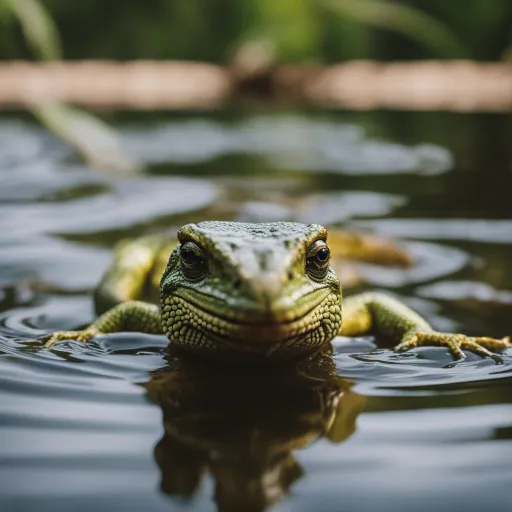Ever wondered about the mysterious sleeping habits of lizards? Curiosity piqued, you find yourself drawn into the fascinating world of reptilian slumber.
Yes, most lizard species are diurnal and sleep at night, following a circadian rhythm similar to that of humans. They seek out secure, hidden spots where they can rest safely from predators during the night.
Overview of Lizard Sleep Patterns
Lizard sleep patterns can vary depending on whether they are nocturnal or diurnal creatures. Nocturnal lizards are active at night, while diurnal lizards are active during the day.
Understanding the sleep patterns of lizards is important to gain insights into their behavior, health, and overall well-being.
Types of Sleep Patterns
When it comes to sleep patterns, lizards can be categorized into two main groups – nocturnal lizards and diurnal lizards. Nocturnal lizards, as the name suggests, are primarily active during the night.
They have adapted to thrive in low light conditions and use their keen nocturnal vision to hunt for food.
Diurnal lizards, on the other hand, are active during daylight hours and rely on sunlight to regulate their body temperature and perform various activities throughout the day.
Nocturnal Lizards vs. Diurnal Lizards
Nocturnal lizards have evolved to take advantage of the reduced competition and lower predator activity that nighttime brings.
These lizards have specialized adaptations such as large eyes, enhanced night vision, and heat-sensitive organs to locate prey.
In contrast, diurnal lizards have adapted to make the most of the abundant sunlight and warmer temperatures during the day.
They rely on basking in the sun to warm themselves up and increase their activity levels.
Factors Affecting Lizard Sleep
Several factors influence lizard sleep patterns, including temperature, light and dark cycles, predator avoidance, and food availability.
Temperature
Temperature plays a crucial role in lizard sleep. Nocturnal lizards often have lower body temperatures compared to diurnal lizards.
They depend on external heat sources, such as warm rocks or burrows, to regulate their body temperature and remain active during the night.
Diurnal lizards, on the other hand, utilize sunlight to warm their bodies and maintain their optimal body temperature.
Light and Dark Cycles
Light and dark cycles are significant cues for lizard sleep patterns. Nocturnal lizards are more active in low-light conditions, which is when they are most likely to hunt and search for mates.
Diurnal lizards are more active during daylight hours, as they rely on sunlight for thermoregulation and to carry out daily activities.
Predator Avoidance
Predators can pose a significant threat to lizards, especially when they are in a vulnerable state during sleep.
Nocturnal lizards have evolved to sleep during the day, hidden away in burrows or well-camouflaged spots to avoid detection by predators.
Diurnal lizards, on the other hand, sleep during the night in safer locations, such as treetops or hidden crevices, to minimize the risk of predation.
Food Availability
Food availability also affects lizard sleep patterns. Nocturnal lizards have adapted to hunt at night when their prey, such as insects, is more active.
By sleeping during the day and being active at night, they maximize their chances of finding and capturing food.
Diurnal lizards, on the other hand, sleep during the night when prey is scarce and are more active during the day when food sources are abundant.
Sleeping Habits of Nocturnal Lizards

Nocturnal lizards have their unique sleeping habits that cater to their nocturnal lifestyle.
Preferred Sleeping Spots
Nocturnal lizards often seek out hidden and sheltered spots to sleep during the day. They may use burrows, leaf litter, rock crevices, or dense vegetation as their preferred sleeping spots.
These locations provide them with protection from predators and offer a sense of security during their sleeping hours.
Sleep Duration
The sleep duration of nocturnal lizards can vary depending on factors such as temperature, food availability, and safety.
Generally, they sleep for longer durations during the day to conserve energy for their active night-time activities.
The specific duration of sleep can vary between different species of nocturnal lizards.
Sleeping Posture
Nocturnal lizards adopt various sleeping postures to maximize their comfort and safety. They may curl up or lay flat against a surface to reduce their visibility and present a small target to potential predators.
These sleeping postures also help them conserve heat and energy while asleep.
Sleeping Habits of Diurnal Lizards
Diurnal lizards have their own set of sleeping habits that align with their daytime activity patterns.
Preferred Sleeping Spots
Unlike nocturnal lizards, diurnal lizards prefer sleeping spots that provide access to sunlight.
They often choose elevated locations such as branches, rocks, or tree trunks to bask in the sun during their sleeping periods.
These spots not only offer warmth but also allow them to quickly resume their activities once they wake up.
Napping Behavior
Diurnal lizards take frequent naps throughout the day to rest and recharge. Unlike a solid stretch of sleep, naps are shorter and intermittent, allowing them to remain alert and responsive to their surroundings.
These napping periods play a vital role in maintaining their energy levels and overall activity during daylight hours.
Alertness Levels
Diurnal lizards are more alert during their waking hours compared to their nocturnal counterparts.
While they sleep, they are still attuned to their surroundings and can quickly respond to potential threats, such as the approach of a predator.
This heightened state of alertness helps ensure their survival and allows them to make the most of their active period during the day.
Sleep-related Behaviors in Lizards
Apart from their sleep patterns, lizards also exhibit various sleep-related behaviors that are fascinating to observe and study.
Torpor and Hibernation
Some lizard species enter a state of torpor or hibernation during periods of extreme environmental conditions.
Torpor is a state of reduced metabolic activity and lowered body temperature that allows lizards to conserve energy when resources are scarce or during unfavorable conditions.
Hibernation, on the other hand, is a more prolonged and deep sleep-like state that aids survival during colder months.
Basking and Sunning
Basking and sunning are essential behaviors displayed by lizards across different species.
By exposing themselves to direct sunlight, lizards absorb heat, which helps regulate their body temperature.
This behavior is particularly important for diurnal lizards, as they rely on the sun’s warmth to maintain their activity levels.
Sleeping in Groups
Some lizard species, especially those that live in social groups, exhibit sleeping behavior in close proximity to one another.
This group sleeping provides safety in numbers, as there are more individuals available to detect and respond to potential threats.
Group sleeping can also promote social bonding and cooperation among these lizards.
Importance of Sleep in Lizards
Just like humans and other animals, sleep plays a crucial role in the overall health and well-being of lizards.
Rest and Rejuvenation
Sleep allows lizards to rest and rejuvenate their bodies after a period of activity. During sleep, their muscles relax, and important physiological processes take place to repair and regenerate cells.
This restorative function helps lizards maintain optimal physical condition and prepares them for the demands of their waking hours.
Metabolic and Physiological Processes
Sleep is also essential for various metabolic and physiological processes in lizards. It aids in digestion, energy conservation, and hormone regulation.
Sleep helps maintain proper functioning of vital bodily systems, ensuring optimal growth, reproduction, and overall health.
Effects of Sleep Deprivation on Lizards
Similar to other animals, sleep deprivation can have detrimental effects on the health and well-being of lizards.
Decreased Immune Function
Sleep deprivation compromises the immune system of lizards, making them more susceptible to diseases and infections.
Adequate sleep is crucial for the proper functioning of the immune system, as it allows the body to produce and activate immune cells necessary for defense against pathogens.
Impaired Cognitive Abilities
Sleep deprivation can negatively impact the cognitive abilities of lizards. Studies have shown that sleep-deprived lizards exhibit reduced attention, memory, and problem-solving skills.
Lack of sleep can impair their ability to efficiently navigate their environment, find food, and engage in vital social interactions.
Reduced Overall Health
Prolonged sleep deprivation can lead to a decline in the overall health of lizards. They may experience weakened physical condition, reduced reproductive capabilities, and increased susceptibility to stress-related diseases.
Chronic sleep deprivation can significantly affect their life expectancy and decrease their chances of survival in the wild.
Research and Studies on Lizard Sleep
Researchers have conducted various studies to better understand the sleep patterns and behaviors of lizards.
Sleep Studies in Wild Lizards
Scientists have employed methods such as tracking devices and video surveillance to observe the sleep patterns of lizards in their natural habitats.
These studies have provided valuable insights into their preferred sleeping spots, sleep duration, and how environmental factors influence their sleep behavior.
Sleep Studies in Captive Lizards
Captive studies have also contributed to our understanding of lizard sleep. By creating controlled environments, researchers can manipulate conditions such as temperature and light cycles to study the effects on sleep patterns.
Captive studies have helped uncover the sleep-related behaviors of lizards, such as torpor and hibernation, in a controlled setting.
Final Thoughts
Understanding the sleep patterns and behaviors of lizards is a crucial aspect of studying their overall biology, health, and ecological roles.
Nocturnal and diurnal lizards have distinct sleep patterns that align with their respective active periods.
Factors such as temperature, light and dark cycles, and predator avoidance influence their sleep behavior.
Sleep-related behaviors, such as torpor, basking, and group sleeping, further enhance our understanding of lizard sleep.
Adequate sleep is essential for lizards’ rest, rejuvenation, and various physiological processes, while sleep deprivation can lead to detrimental effects on their immune function, cognitive abilities, and overall health.
Through both field and captive studies, researchers continue to uncover the intricacies of lizard sleep, providing valuable insights into their fascinating and diverse lives.
Frequently Asked Questions
Q: What time do lizards go to bed?
A: Lizards generally follow the cycle of daylight and darkness. They are likely to “go to bed” or become less active as it gets dark, though this can vary among species.
Q: What kind of lizard comes out at night?
A: Nocturnal lizards, like geckos, are active at night. They hunt for food and are more visible during these hours.
Q: How long do lizards sleep at night?
A: Lizards can sleep for an average of 8 to 12 hours at night, depending on the species and their natural habitat’s conditions.
Q: Do house lizards sleep at night?
A: Yes, house lizards or common geckos, which are often nocturnal, are active at night but will find a place to rest and sleep once it becomes light.
Q: Do lizards sleep at night or morning?
A: It depends on the species. Nocturnal lizards are active at night and sleep during the day, while diurnal lizards are active during the day and sleep at night.
Q: Do lizards sleep on walls?
A: Many lizards, especially house geckos, can sleep on walls thanks to their specialized toe pads that allow them to adhere to vertical surfaces.
Q: Do lizards come near humans when sleeping?
A: Lizards generally avoid humans, but in search of warmth or prey (like insects attracted to lights), they may inadvertently come near humans while they are sleeping, especially in regions where lizards are common indoors.




